Unit4__第一课时导学案
人教版七年级英语下册导学案-Unit 4 Don't eat in class

Unit 4 Don’t eat in class .第1课时Section A 新授课导学案【预习指导】一、扫清障碍根据音标读出19到21页的单词,能初步记忆单词。
二、课本预习:熟读课本19 到21页, 划出重要的新短语,新句型。
三、预习效果检查。
1.在外面________2.穿,戴________3.重要的________4.带来________5.校服________6.安静的________7.规则8 。
到达________9.走廊________ 10 。
大厅________ 11.餐厅________ 12.听________ 13. 打架_________ 14.抱歉的,难过的________1.听音乐_________________2.在音乐教室里_________________3.在外面吃东西_________________4.戴帽子_________________5.很多规则_________________6.…中的一些_________________7.拿来,带来_________________ 8.音乐播放器_________________9.不得不,必须_________________ 10.保持安静_________________11.图书馆规则_________________ 12.在我梦想中的学校_________________ 13.上课迟到14.准时15.在走廊里_________________ 16. 在餐厅里_________________17.在教室里_________________ 18.在图书馆_________________19.在课堂上_________________ 20.穿校服_________________【知识点拨】1. arrive late for= be late for 做某事迟到。
Don’t arrive late for the meeting next time 下次开会别迟到2、语法(祈使句)祈使句是用来表示请求、命令、叮嘱、号召或者劝告等的句子,这类句子的主语常是第二人称you,也就是听话者,因而you常省去了。
Unit4 Don't eat in class导学案
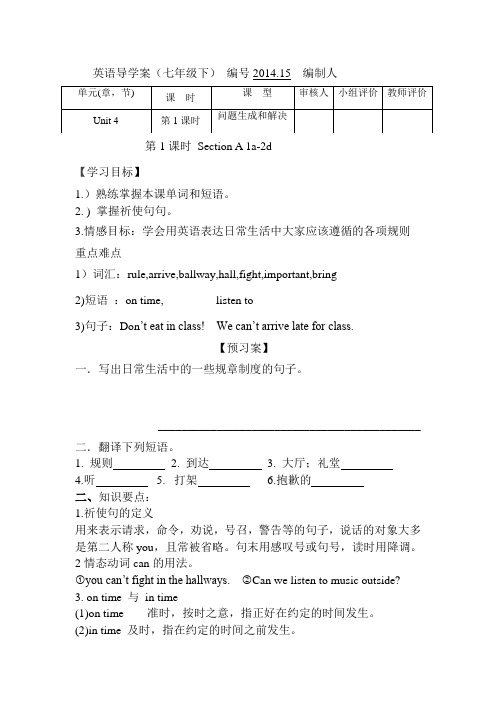
英语导学案(七年级下)编号2014.15 编制人单元(章,节) 课时课型审核人小组评价教师评价Unit 4 第1课时问题生成和解决第1课时Section A 1a-2d【学习目标】1.)熟练掌握本课单词和短语。
2. ) 掌握祈使句句。
3.情感目标:学会用英语表达日常生活中大家应该遵循的各项规则重点难点1)词汇:rule,arrive,ballway,hall,fight,important,bring2)短语:on time, listen to3)句子:Don’t eat in class! We can’t arrive late for class.【预习案】一.写出日常生活中的一些规章制度的句子。
_______________________________________________________________________________ _______________________________________________________________________________ ________________________________________________________________二.翻译下列短语。
1. 规则2. 到达3. 大厅;礼堂4.听5. 打架6.抱歉的二、知识要点:1.祈使句的定义用来表示请求,命令,劝说,号召,警告等的句子,说话的对象大多是第二人称you,且常被省略。
句末用感叹号或句号,读时用降调。
2情态动词can的用法。
①you can’t fight in the hallways.②Can we listen to music outside?3. on time 与in time(1)on time 准时,按时之意,指正好在约定的时间发生。
(2)in time 及时,指在约定的时间之前发生。
4.lisen 与hear(1)Lisen 不及物动词,强调听的动作,意为“听”。
Unit 4 Grandparents第一课时(27张PPT)教案导学案

3.听读课文,注意课文中提到的频度副词。
4.讨论总结频度副词:always, usually, often, sometimes, never
5.尝试翻译频度副词:
always _____ usually_____ often_____
sometimes_____ never_____
三.按要求写句子。
1.I usuallygoto the park.(对划线部分提问)
______________________
2.I often play sport with my grandpa. (变一般疑问句)
_________________________
3.She plays football on Sundays. (变否定句)
Unit4 Grandparents第一课时导学案
单元
Unit 4 Grandparents
年级
5
学习目标
1.能听懂,会说usually, often, visit, sometimes, always, never, play sports等单词和短语。
2.能听懂,会说询问对方常做的活动的功能句--What do you usually do with your grandparents?--I usually …和一般疑问句Do you play sport with your grandparents?
___________________________
参考答案:
一、1. e; e 2. o; e 3. u; u 4. o; e; i 5. a; a
二、1.B 2. A 3. B 4. C 5. A
七年级英语下册Unit4Donteatinclass第1课时SectionA1a2c导学案人教新目标版

Unit 4 Don't eat in class.第一课时Section A(1a~2c)1.Key words and phrases:rule,arrive,hall,dining,listen,fight,sorry,outside,wear,important,bring,uniform,quiet,dining hall,arrive late for school,(be) on time,listen to…, go out,follow/break the rules,in class,be/keep quiet,a lot of,bring…to…,wear a hat,have to,music player2.Key sentences:(1)—Don't run in the hallways.—Sorry,Ms.Clark.(2)—What are(some of)the rules?—Well,we can't arrive late for class.(3)We must be on time.(4)We also have to be quiet in the library.3.Skills:(1)谈论校规,能正确使用否定祈使句陈述规章要求,对别人的劝告、警告做出礼貌回应。
(2)听清楚并能正确使用情态动词can,can't。
(3)能正确使用情态动词have to,must。
(4)能正确使用祈使句谈论规章制度。
4.Emotion:了解校规,规范在校行为。
5.The guidance of learning methods【学法指导】小组合作6.Learning important and difficult points【学习重难点】祈使句Don't…的用法。
(一)自主学习1.预习Page19-20中的生词,根据音标会读,知道汉语意思。
四川省蓬安县七年级英语下册 Unit 4 Don’t eat in class(第1课时)导学案(无答案)(新版)人教新目标板
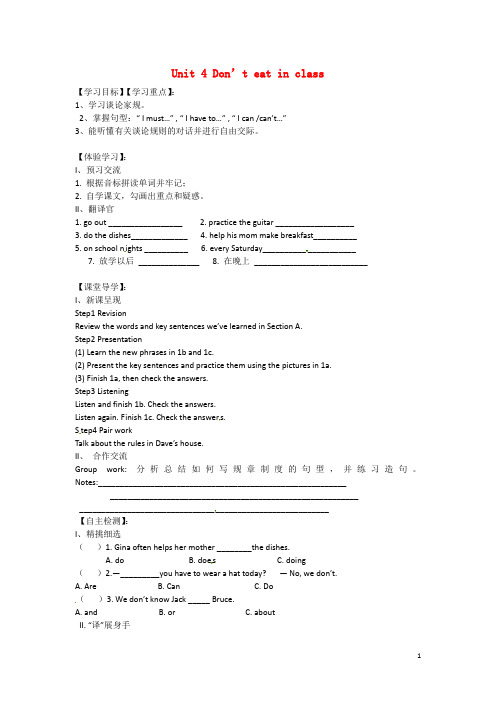
Unit 4 Don’t eat in class【学习目标】【学习重点】:1、学习谈论家规。
2、掌握句型:“ I must…” , “ I have to…” , “ I can /can’t…”3、能听懂有关谈论规则的对话并进行自由交际。
【体验学习】:I、预习交流1. 根据音标拼读单词并牢记;2. 自学课文,勾画出重点和疑惑。
II、翻译官1. go out _________________2. practice the guitar __________________3. do the dishes_____________4. help his mom make breakfast__________5. on school n ights __________6. every Saturday_____________________7. 放学以后______________ 8. 在晚上__________________________【课堂导学】:I、新课呈现Step1 RevisionReview the words and key sentences we’ve learned in Section A.Step2 Presentation(1) Learn the new phrases in 1b and 1c.(2) Present the key sentences and practice them using the pictures in 1a.(3) Finish 1a, then check the answers.Step3 ListeningListen and finish 1b. Check the answers.Listen again. Finish 1c. Check the answer s.S tep4 Pair workTalk about the rules in Dave’s house.II、合作交流Group work: 分析总结如何写规章制度的句型,并练习造句。
人教版初三英语上册Unit4第一课时导学案

Unit 4 what’s the best movie theater?Section A 1a—2c【学习目标】1.单词及短语:comfortable,seat,screen,close,theater,学习worst 、cheaply、song、choose 、carefully 谈论clothes store和radio station2.学会并能掌握形容词、副词最高级的构成方法和用法(难点)【学习重点难点】学会并能掌握形容词、副词最高级的构成方法和用法(难点)【学法指导】1、浏览信息2、作比较3、合作学习【教学过程】学习任务一导入(启发探究)1我们曾在Unit3学过形容词比较级的构成及其用法,试着完成下面的练习①Who is (outgoing),Lily or Lucy?②Peter is (funny)than any other boy in his class.2. 归纳总结①A比B更……:A+be+形容词比较级+the+B.②A和B一样:(as……as)③A是两者中更……的一个:④越……越……学习任务二交流(合作探究)1.完成1a discuss:∙do you like to go to the movies?∙who is your favorite movie star?∙why do you like him / her?∙what kind of movies do you like best?∙where do you want to go ,cinema、radio station or theater?whyif there are many movie theaters, which movie theaters do you want to go to?what’s important or not important for a cinema? let’s see 1a. how do you choose what movie theater to go to? write the things in the box under "important" or "not important".想想译译comfortable seats big screens cheap友好的服务新电影close to homein a fun part of town popular如果你去电影院看电影,你认为上面列举的这些,哪些对你来说显得重要,哪些不重要?请试着完成1a,也可以增加一些内容。
鲁教版初一英语下册Unit 4导学案
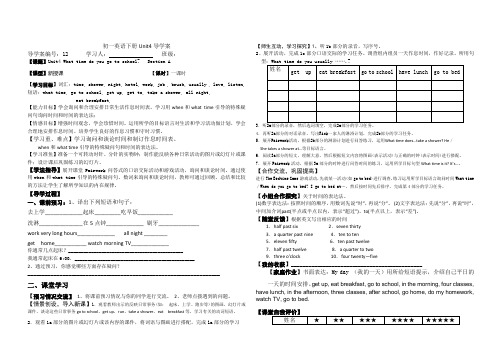
初一英语下册Unit4导学案导学案编号:12 学习人:班级:【课题】Unit4 What time do you go to school? Section A【课型】新授课【课时】一课时【学习目标】词汇:time, shower, night, hotel, work, job , brush, usually , love, listen, 短语:what time, go to school, get up, get to, take a shower, all night,eat breakfast,【能力目标】学会询问和合理安排日常生活作息时间表。
学习用when和what time引导的特殊疑问句询问时间和时间的表达法;【情感目标】增强时间观念,学会珍惜时间。
运用所学的目标语言对生活和学习活动做计划,学会合理地安排作息时间。
培养学生良好的作息习惯和守时习惯。
【学习重、难点】学习询问和谈论时间和制订作息时间表。
when和what time引导的特殊疑问句和时间的表达法。
【学习准鱼】准备一个可转动时针、分针的实物钟;制作能反映各种日常活动的图片或幻灯片或课件;设计课后巩固练习的幻灯片。
【学法指导】展开课堂Pairwork问答式的口语交际活动和游戏活动,询问和谈论时间。
通过使用when和what time引导的特殊疑问句、数词来询问和谈论时间,教师可通过回顾、总结和比较的方法让学生了解所学知识的内在规律。
【导学过程】一、课前预习:1、译出下列短语和句子:去上学_____________起床_________吃早饭____________洗淋_______________在5点钟_____________ 刷牙______________work very long hours_____________all night ________get home___________ watch morning TV_____________你通常几点起床?_____________________________________________我通常起床在6:00. _______________________________________________2、通过预习,你感觉哪些方面存在疑问?__________________________________________________________________二、课堂学习【预习情况交流】1、将课前预习情况与你的同学进行交流。
七年级英语上册 Unit 4 Where 's my schoolbag(第1课时)导学案(无答案)(新版)人教新目标版

(1)口头操练Where's…?/Where are…?等句型
A: Where 's my schoolbag? B: It's under the table
A: Where are my books? B: They're on the sofa.
四、展示提炼拓展延伸
选择题
五、知识Where is my book? It's u nder _____ table . A. my the B. the my C. my
( )2. Where ____ his keys? A. is B. are C. am D. be
Unit 4 Where 's my schoolbag
课型
新授课
学习目标:
1.学会一些表示家具的名词以及学习用品的单词。
2.学会方位介词,in, on, unde r, behind,的用法。
3.熟练运用句型--Is the baseball on the sofa?--Yes, it is./No,it isn't.
(2)小组为单位,两人合作,结合1a图画或实物,练习自己的对话并展示。
5 .听力:听录音完成2a,2d。
6.结对活动。就2b图中物品的位置,运用句型Are the keys on the sofa? No, they aren't. They're on the table.与搭档问答
7.展示对话2d。先自读对话一遍,再与搭档分角色练习朗读对话(直至能够脱稿),最后抽小组成员比赛朗读
八年级英语(上)unit4第一课时导学案(人教版英语八年级)

八年级英语(上)unit4第一课时导学案(人教版英语八年级)年级 Grade 8学科英语主备教师授课教师备课组长八年级备课组课题 Unit 4 Section A (1a-2c) 课型新授课第1课时第周学习目标学习运用一般现在时谈论怎样到达基地,掌握How 引导的特殊疑问句及回答。
重点难点 1.单词及短语:subway, train, forty, fifty, seventy, eighty, ninety, hundred, minute, take, by bus, How long.2.交际用语:How do you get to school? I ride my bike.How long does it take? It takes about forty minutes.学法指导 1. Listening, reading and speaking.2. Role playing (pair work and groupwork)教学媒体多媒体,录音机教学活动一、【自主学习】1.复习检测:I can do乘公交车骑自行车步行走路上学乘火车乘地铁到达四十分钟2.复习:Review the new words of unit 4(听录音跟读)二、【合作探究】(一)读一读, 议一议。
看课本1a,小组合作讨论,完成1a,朗读记忆二遍。
(二)听一听,写一写,读一读1.听录音,完成1b2.听录音,完成2a,2b3.听录音,完成2c,掌握How, How long 引导的特殊疑问句。
再听一遍,学生跟读。
4.pairwork, 仿2d,学生进行小组会话训练。
(三)读一读,议一议学生自读Grammar Focous, 小结重点句型。
①②三、【巩固测评】练习 1: 英汉互译(1)骑车上学(5)take the train(2)到达学校(6)How long(3)大约三十分钟(7)seventy-nine(4)一百八十(8)walk to home练习2:用所给词的适当形式填空。
九Unit 4导学案
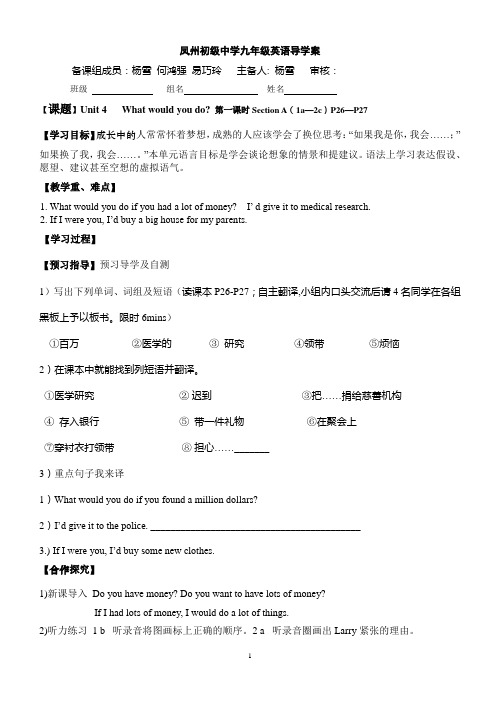
凤州初级中学九年级英语导学案备课组成员:杨雪何鸿强易巧玲主备人: 杨雪审核:班级组名姓名【课题】Unit 4 What would you do?第一课时Section A(1a—2c)P26—P27【学习目标】成长中的人常常怀着梦想,成熟的人应该学会了换位思考:“如果我是你,我会……;”如果换了我,我会……。
”本单元语言目标是学会谈论想象的情景和提建议。
语法上学习表达假设、愿望、建议甚至空想的虚拟语气。
【教学重、难点】1. What would you do if you had a lot of money? I’ d give it to medical research.2. If I were you, I’d buy a big house for my parents.【学习过程】【预习指导】预习导学及自测1)写出下列单词、词组及短语(读课本P26-P27;自主翻译,小组内口头交流后请4名同学在各组黑板上予以板书。
限时6mins)①百万_______ ②医学的_______ ③研究_______ ④领带______ ⑤烦恼_____2)在课本中就能找到列短语并翻译。
①医学研究 _______ ②迟到_______ ③把……捐给慈善机构 _______④存入银行_______ ⑤带一件礼物 _______ ⑥在聚会上_______⑦穿衬衣打领带_______ ⑧担心……_______3)重点句子我来译1)What would you do if you found a million dollars?__________________________________2)I’d give it to the police. __________________________________________3.) If I were you, I’d buy som e new clothes. _________________________【合作探究】1)新课导入Do you have money? Do you want to have lots of money?If I had lots of money, I would do a lot of things.2)听力练习1 b 听录音将图画标上正确的顺序。
Unit 4 Our neighbours第一课时 课件ppt(28张PPT)导学案

Blackboard design
1.词汇: neighbour, daughter, son
this morning, last weekend
2.句型: Who are your neighbours?
The Greens are my neighbours. Did you…this morning? Yes, I did./ No, I didn’t.
Summary
1.重点词汇: neighbour, daughter, son, this morning, last weekend 2.谈论邻居: Who are your neighbours? The Greens are my neighbours. Did you…this morning? Yes, I did./ No, I didn’t.
Let’s learn
the Greens 指格林一家人
The Greens are my neighbours. They’re from the US.
Let’s learn
the +姓氏的复数形式 用来表示这一对夫妇或这一家人, 此时,谓语动词要用复数
如: The Greens are from the US. 格林(夫妇)一家人来自美国。 The Whites live in New York. 怀特(夫妇)一家人住在纽约。
Practice
Did the Lis…?
the Lis last night go to the cinema
No, … didn’t. ……
Exercise
用所给词的正确形式填空
1. Who are your__n_e_ig_h_b_o_u_r_s_(neighbour)? 2.The Greens ___a_r_e___ (be)from the US. 3. I sometimes __m_e_e_t__(meet) them in the morning. 4. _D__id__ you __p_la_y_(play) with Sam last weekend? 5. Mr. Wu has two _s_o_n_s_(son).
Unit4 When is the art show?第1课时 (导学案) PartA Let's

Unit4 When is the art show?Part A: Let’s tryVocabularyBefore we start this lesson, let’s go over some new vocabulary words related to time.•morning [ˈmɔːrnɪŋ] 早上•afternoon [ˌɑːftəˈnuːn] 下午•evening [ˈiːvnɪŋ] 晚上•midnight [ˌmɪdˈnaɪt] 午夜•noon [nuːn] 中午•day [deɪ] 白天•week [wiːk] 周•month [mʌnθ] 月•year [jɪr] 年PracticeNow, let’s practice using these new vocabulary words. Look at the table below and fill in the blank with the correct word.Time Blank9 a.m.morning2 p.m.afternoon7 p.m.evening12 a.m.midnight12 p.m.noonDaytime day4 weeks month12 months year1.I like to go for a walk in the ___________.2.Let’s have lunch at ___________.3.We usually have dinner in the ___________.4.I always go to bed before ___________.5._________ is the middle of the day.6.___________ is the time when it’s light outside.7.There are four ___________ in a ___________.8.There are twelve ___________ in a ___________.ConversationLet’s practice using these words in a conversation.A: What time do you usually wake up in the ___________?B: I usually wake up at 6 o’clock in the ___________.A: Really? I usually wake up later in the ___________.B: Do you wake up in the ___________ or in the ___________?A: I usually wake up in the ___________. Do you?B: No, I usually wake up in the ___________.Part A: Let’s talkPresentationToday we are going to learn how to ask and answer questions about events and the time they occur. We will be reading a dialogue between two friends, Amy and Tony.Amy: Hi, Tony.Tony: Hi, Amy.Amy: When is the art show?Tony: The art show is on May 5th, this Sunday.Amy: What time is the art show?Tony: It starts at 2 p.m. and ends at 5 p.m.ListeningNow, let’s listen to the dialogue again and pay attention to the questions and answers.[caption id=。
八年级英语上册Unit4 Topic1 Section A导学案

八年级英语导学案Unit4 Our WorldTopic 1 Plants and animals are important to us.SectionA设计人: 赵爱琴备课组长:杨振娟审核人:连俊伟一、学习目标1、掌握新单词、重要的短语及句子2、掌握形容词的比较级和最高级的变化规律及用法。
3、培养学生对自然的热爱之情和保护自然地意识。
二、重难点1.What are you thinking about?2.Qreener trees,cleaner rivers.3.I’m the strongest4.The pig is stronger than you.5.I’m the biggest of all.6.I’m much faster than you .7.I’m a little bigger than you .三、课前学习导航1、听磁带并跟读,读准单词并会拼写,能用正确的语音、语调熟读1a。
2、结合学习目标,找出1a中关于形容词比较级的短语。
__________________ ____________________3、结合课后注释及参考书预习本话题的要点知识,形容词的计较级和最高级。
形容词共分为三个等级:_____ ______ _______形容词的比较级用于______者之间的比较意为更……。
它的最高级用于_____者或____者以上的比较,意为最…….比较级和最高级的规则变化为:a ___________________________________________例如:long _______ ________strong ______ ______b___________________________________________例如:nice_______ _______fine_______ ________c___________________________________________例如:hot_______ _______big________ ________d___________________________________________例如:happy_______ _______healthy______ _______3、预习2a,找出形容词比较级和最高级的句子。
《名校课堂》八年级英语人教版上册导学案:Unit 4 第一课时
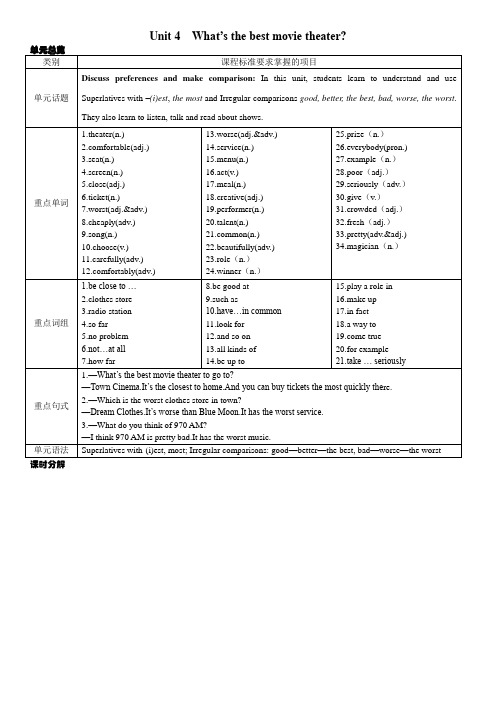
Unit 4 What’s the best movie theater?单元总览类别课程标准要求掌握的项目单元话题Discuss preferences and make comparison: In this unit, students learn to understand and use Superlatives with –(i)est, the most and Irregular comparisons good, better, the best, bad, worse, the worst. They also learn to listen, talk and read about shows.重点单词1.theater(n.)fortable(adj.)3.seat(n.)4.screen(n.)5.close(adj.)6.ticket(n.)7.worst(adj.&adv.)8.cheaply(adv.)9.song(n.)10.choose(v.)11.carefully(adv.)fortably(adv.)13.worse(adj.&adv.)14.service(n.)15.menu(n.)16.act(v.)17.meal(n.)18.creative(adj.)19.performer(n.)20.talent(n.)mon(n.)22.beautifully(adv.)23.role(n.)24.winner(n.)25.prize(n.)26.everybody(pron.)27.example(n.)28.poor(adj.)29.seriously(adv.)30.give(v.)31.crowded(adj.)32.fresh(adj.)33.pretty(adv.&adj.)34.magician(n.)重点词组1.be close to …2.clothes store3.radio station4.so far5.no problem6.not…at all7.how far8.be good at9.such as10.have…in common11.look for12.and so on13.all kinds of14.be up to15.play a role in16.make up17.in fact18.a way toe true20.for example21.take … seriously重点句式1.—What’s the best movie theater to go to?—Town Cinema.It’s the closest to home.And you can buy tickets the most quickly the re.2.—Which is the worst clothes store in town?—Dream Clothes.It’s worse than Blue Moon.It has the worst service.3.—What do you think of 970 AM?—I think 970 AM is pretty bad.It has the worst music.单元语法Superlatives with-(i)est, most; Irregular comparisons: good—better—the best, bad—worse—the worst 课时分解第一课时Section A(1a~2d) 知识目标类别课时要点重点单词theater(n.)戏院;剧院comfortable(adj.)使人舒服的;舒适的seat(n.)座位;坐处(如椅子等)screen(n.)银幕;屏幕close(adj.)(在空间、时间上)接近ticket(n.)票;入场券重点单词worst(adj & adv.)(bad和badly的最高级)最差(的);最坏(的);最糟(的)cheaply(adv.)便宜地;低廉地song(n.)歌;歌曲DJ(n.)(电台、电视台、俱乐部的)音乐节目主持人choose(v.)选择;挑选carefully(adv.)细致地;小心地;谨慎地fresh(adj.)新鲜的;清新的comfortably(adv.)舒服地;舒适地重点词组be close to …接近,靠近clothes store服装店radio station广播站no problem没问题so far到目前为止;迄今为止重点句式1.—What’s the best movie theater to go to?最好的电影院是什么?—Town Cinema. It’s the closest to home. And you can buy tickets the most quickly there.镇电影院。
Unit4 Numbers Lesson1(导学案)人教新起点版英语一年级上册

Unit 4 Numbers Lesson 1(导学案)Part One:Pre-reading1.Do you like numbers? Why/why not?2.What is your favorite number?3.How do you write numbers in English? Can you write from 1-20?4.What number comes after 29? What number comes before 31?Part Two:While-readingVocabulary1.one - 12.two - 23.three - 34.four - 45.five - 56.six - 67.seven - 78.eight - 89.nine - 910.ten - 1011.eleven - 1112.twelve - 1213.thirteen - 1314.fourteen - 1415.fifteen - 1516.sixteen - 1617.seventeen - 1718.eighteen - 1819.nineteen - 1920.twenty - 2021.thirty - 3022.forty - 4023.fifty - 5024.sixty - 6025.seventy - 7026.eighty - 8027.ninety - 9028.one hundred - 100Text1.two ducks - 22.three pigs - 33.four cats - 44.five dogs - 55.six rabbits - 66.seven chickens - 77.eight horses - 88.nine monkeys - 99.ten fish - 10Questions1.How many ducks are there?2.How many pigs are there?3.How many cats are there?4.How many dogs are there?5.How many rabbits are there?6.How many chickens are there?7.How many horses are there?8.How many monkeys are there?9.How many fish are there?Part Three:Post-reading1.Review the numbers from 1-20.2.Write down the numbers from 30-40.3.Write down the numbers from 50-60.4.Write down the numbers from 80-90.plete the sentences:a)There are _____ dogs.b)T here are _____ horses.c)There are _____ cats.d)T here are _____ monkeys.Extension1.Find out how to say numbers beyond 100 and practice saying them.2.Create your own questions using the animals in the text and ask your friends to answer.3.Write down the numbers in words and practice saying them out loud.4.Play games with numbers such as counting, addition and subtraction.ConclusionIn this lesson, we have learned the basic numbers from 1-10 and explored some of the numbers from 11-100. We also practiced counting animals and writing down the numbers in English. Keep practicing and have fun with numbers!。
高中英语真题-学高中英语Unit4Pygmalion第1课时导学案新人教版选修8
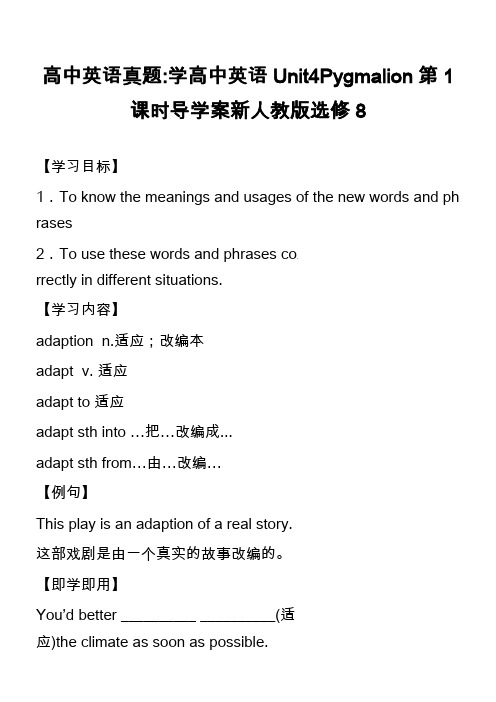
高中英语真题:学高中英语Unit4Pygmalion第1课时导学案新人教版选修8【学习目标】1.To know the meanings and usages of the new words and ph rases2.To use these words and phrases correctly in different situations.【学习内容】adaption n.适应;改编本adapt v. 适应adapt to 适应adapt sth into …把…改编成...adapt sth from…由…改编…【例句】This play is an adaption of a real story.这部戏剧是由一个真实的故事改编的。
【即学即用】You’d better __________ __________(适应)the climate as soon as possible.2. hesitate vi. 犹豫;踌躇hesitant adj. 犹豫的;踌躇的;迟疑的hesitation n. 踌躇,犹豫hesitate to do sth. 迟疑做某事hesitate about (doing) sth. (做)某事犹豫不决without hesitation 毫不犹豫地【即学即用】(1)Don’t __________ _________ that. Do it at once.对于那件事不要再犹豫,马上去做吧。
(2)In caseyou need something, please don‘t_________ __________________me.如果你需要什么东西,请不要犹豫,尽管对我说。
hesitate about , hesitate to ask(3)____________ __________, he jumped into the river to save the drowning child.他毫不犹豫地跳下河去救溺水的孩子。
Unit 4 Don’t eat in class复习导学案

七年级英语下册导学案No.3姓名:__________ 学号:________ 评定等级__________Unit 4 Don’t eat in class.(第一课时)短语归纳1. on time 准时,按时2. listen to …听……3. in class 在课上4. be late for 做……迟到5. have to 不得不6. be quiet 安静7. go out 外出8. do the dishes 清洗餐具9. make breakfast 做早饭10. make (one’s) bed 铺床11. be noisy 吵闹12. keep one’s hair short 留短发13. play with sb. 和某人一起玩14. play the piano 弹钢琴15. have fun 玩得高兴16. make rules 制订规则用法集萃1. Don’t + 动词原形+其他,不要做某事2. help sb. (to) do sth. 帮助某人做某事3. too many + 可数名词复数太多的……4. practice doing sth. 练习做某事5. be strict with sb. 对某人要求严格6. be strict in sth. 对某事要要求严格7. leave sth sp. 把某物忘在某地8. keep + 宾语+形容词使……保持某种状态9. learn to do sth. 学会做某事10. have to do sth. 不得不做某事经典句型必背1. Don’t arrive late for class. 上课不要迟到。
2. Can we bring music players to school? 我们可以带音乐播放器到学校吗?3. And we always have to wear the school uniform. 并且我们总是不得不穿校服。
Unit4 Do you have any cousins第一课时导学案

跟老师读对话,模仿语音语调;
5.Game time
6.Look and answer
学生根据图片回答问题
7ome和any的用法
8.小组合作,介绍自己的家庭成员。
9.掌握句型This is my cousin. Do you have any cousins? Yes, I do./ No, I don’t.
AaBanyCsome
2.____ this your aunt?
A.IsB.isC.are
3._____are my parents.
A.TheirB.ThemC,They
4.This is my _______ . He is a student.
A,fatherB,cousinC.aunt
5.What_______ the boy’s name?
【当堂检测】
一、选出不同类单词。
()1. A.familyB.friendC.swim
()2. A.uncleB.smileC.aunt
()3. A.cousinB.sisterC.write
()4. A.meB.heC.she
()5. A.youB.myC.your
二.选择填空
1Do you have _____ cousins?
二.1.B 2.A 3.C 4.B 5.B
三.1. They’re 2.grandmother 3.families 4.has 5.me
课
后
反
思
②能用句型Do you have any cousins? Yes, I do./ No, I don’t.谈论家庭成员情况。
3.过程与方法目标:阅读家谱,理解家庭成员之间的关系。
Unit4BodyLanguagereadingReadingandThinking导学案-高中英语

选修一Unit4 reading导学提纲(第一课时)班级:姓名:使用时间:_____________【学习目标】1.Get a better understanding of body language by grasping the main points of the passage.2.Develop the ability to identify the topic sentence in a para and figure out the structure ofa passage.3.Develop a sense of crosscultural munication by identifying the feature of body language.一、导1.在与他人交流时_______________2.因文化而异_______________________3.与…文化相适应___________4.眼神交流;眼神接触_______________5.表示兴趣_________________6.相比之下__________________________7.被认可_____________ 8.被允许做某事______________________9.表示尊重___________ 10.向下看;蔑视_______________________11.使用这个手势_________ 12.遇到同一种手势___________________13.避免做某事____________ 14.摇头__________________________15.与…相比较_________ 16.相反的含义_______________________17.亲吻某人的脸颊__________ 18.喜欢做某事__________________________19.弯腰鞠躬___________________ 20.点头__________________________21.用手转圈___________________ 22.度过难关__________________________23.打破障碍/隔阂___________ 24.感到沮丧和孤独_______________________二、思、议、展、评Activity1: PredictionWhat do you think will be talked about the text?Activity2: Fast ReadingListen and try to answer the following questions:1. What is the main idea of the text?A. The cultural similarities of body languageB. The differences between body language and spoken language.C. The characteristics of body languageD. Body language in different cultures 2. What’s the type of the passage?A. A narrationB. An argumentationC. An expositionD. An application3. what’s the structure of the passage?A. B. C.①①②①②③④⑤⑥③④⑤⑥②③④⑤⑥4. Match the main idea with each part.Para.1 A. The same gesture may have different meanings in different countries.Para.2 B. Smiling has many different uses.Paras.34 C. Body language varies from culture to culture.Para.5 D. Both words and body language are of importance in interactions with others.Para.6 E. Some gestures seem to have the same meaning everywhere. Activity3: Careful ReadingPara.1:1.Can you guess the meaning of the word “interaction”according to the context?2.What is the function of the last sentence in Paragraph 1?Para.6:Find the difference uses of smiling:三、合作探究——议、展、评Activity 4:DiscussingCan you think of some other uses of smiling?四、随堂检测——检1. How is the passage developed?(四选二)A. By giving dataB. By making parisonC. By giving examplesD. By giving definitions2. Which statement does the author possibly agree with?A. Never too old to learn.B. Four eyes see more than two.C. Action speaks louder than words.D. When in Rome, do as the Romans do.3. Fill the blanks with correct words or the correct forms of the given words.We use both words and body language __________(express) our thoughts and opinions in our ____________(interact) with other people. Just like spoken language, body language _________(vary) from culture to culture. The crucial thing is _________(use) body language in a way that is appropriate to the culture you are in. For example, _______ (make) eye contact is not appropriate to all cultures. Some gestures like the one for “OK’ have dfferent meanings in different cultures. Even the gestures we use for “yes”and “no”differ around the world. There are also differences ______ how we touch each other, how close we stand _____ someone we are talking to, and how we act when we meet or part. Such gestures _____ the ones for “sleep”and “I am full” seem to have _____ same meaning everywhere.Some body language has many different uses. One example is smiling.五、总结归纳——结(本节课知识点归纳,学生当堂背诵)Recite the key words and phrases of this passage.。
- 1、下载文档前请自行甄别文档内容的完整性,平台不提供额外的编辑、内容补充、找答案等附加服务。
- 2、"仅部分预览"的文档,不可在线预览部分如存在完整性等问题,可反馈申请退款(可完整预览的文档不适用该条件!)。
- 3、如文档侵犯您的权益,请联系客服反馈,我们会尽快为您处理(人工客服工作时间:9:00-18:30)。
Unit4 第一课时导学案
教学目标:
一.能够听懂、会说、会用这些句子:
Whose coat is this? Liu Zhaoyang, is this your coat?
No, it isn’t. My coat is red.\Yes, It’s my coat. Thank you very much. You’re welcome.
二.能够掌握四会单词:
coat cap skirt dress sweater
教学重点:
一.掌握四会单词:
coat cap skirt dress sweater
二.掌握运用句型:
A: Whose coat is this? Liu Zhaoyang, is this your coat?
B: No, it isn’t. My coat is red.\Yes, It’s my coat. Thank you very much.
C: You’re welcome.
教学难点:
一.能够熟练运用一般疑问句及它的两种回答。
二.掌握形容词性物主代词的用法。
教学环节:
一. 学习目标(2分钟)
(一)出示学习目标
1.能够听懂、会说、会用这些句子:
A: Whose coat is this? Liu Zhaoyang, is this your coat?
B: No, it isn’t. My coat is red.\Yes, It’s my coat. Thank you very much.
C: You’re welcome.
2.能够掌握四会单词:
coat cap skirt dress sweater
(二)老师朗读学习目标,学生认真听讲明确本节课任务。
二. 自主学习(18分钟)
(一)温故知新
1.复习上学期学过表示颜色的一些词,并做课本第25页Color the clothes.
2.师生进行对话引出本课话题:
T: What color is this?
Ss: It’s yellow.
T: What color is my coat? (老师指着自己的上衣问)
Ss: It’s green.紧接着老师指着教室课桌上放的一件上衣问T: Whose coat is this? (老师板书课题,接着又问)Wang Gang, is this your coat?学生不会用英语说的话,老师可提供帮助。
学生指着自己的衣服说:
Sw: No, it isn’t. My coat is red.
T: is this your coat? (老师又指着另外一个同学问)
Sa: Yes, it is. It’s my coat.
(二)阅读方法
1. 句型词汇学习:
听录音,小组合作学习单词,讨论解决问题,解决不了的请老师指导。
2.学生自读,互读,并根据图片理解单词意思。
3.展示成果。
4.写一写。
(鼓励学生边读边写,把所学的单词拼写会)
5.教师检测拼写情况
6.听录音,第一遍,整体感知对话,第二遍掌握正确发音,个别难词应该反复跟读。
三.展示交流(8分钟)
(一)出示单词,师范读,学生试着读一读。
coat cap skirt dress sweeter
(二)教师巡视,发现学生的读音错误并纠正
(三)读下面的句子并试着理解:
A: Whose coat is this? Liu Zhaoyang,
is this your coat?
B: No, it isn’t. My coat is red.\Yes, It’s my coat.
Thank you very much.
C: You’re welcome.
四.点拨升华(8分钟)
(一)巩固练习
1.首先老师放课文录音,让学生复述。
2.老师讲解这段对话。
3.同桌两人一组练习本课对话,然后进行情景表演。
2.拓展提升:
用本节课我们所学单词和my、your造句并进行对话。
五. 课堂作业:(4分钟)
(一)作业当堂清
补全单词中所缺的字母
co_at c_p sk_rt dr_ss sw_ _ter
(二) 挑战自我
选择正确的选项
(1) -Whose skirt is this?
-It’s ___ skirt.
A. I
B. My
C. my
D. me
(2) ___ sweater is that?
A. Who
B. who
C. Whose
D. whose
(3) -Thank you very much.
- ___ welcome.
A. You’re
B. you’re
C. It’s
(4)-Is this your coat?
-___. It’s Liu Zhaoyang’s coat.
A. No, it isn’t.
B. Yes, it isn’t
C. No, it is.
D. Yes, it is.
板书设计:
Unit 1 Whose Coat Is This?
coat A: Whose coat is this? Liu Zhaoyang,
cap is this your coat?
skirt B: No, it isn’t. My coat is red.
dress Yes, It’s my coat. sweater Thank you very much. C: You’re welcome.
形容词性物主代词:my your。
